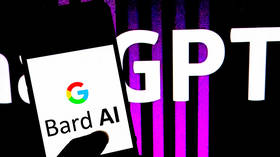Music giant raises alarm over AI hit
After a song featuring the AI-generated voices of the rappers Drake and The Weeknd went viral on Monday, the world’s biggest record label demanded a reckoning from streaming platforms. The Netherlands-based Universal Music Group (UMG), which represents both artists, has already tried to block artificial intelligence programs from accessing its catalog, but that appears to be easier said than done.
A song titled ‘heart on my sleeve’ clocked more than 15 million plays on TikTok, 625,000 on Spotify and over 230,000 on YouTube in just a few hours, before the platforms moved to take it down for copyright infringement.
Drake and The Weeknd are both represented by Republic Records, a subsidiary of UMG. The Dutch-based label is the world’s largest, with a market share greater than all independents combined.
After the incident, UMG issued a statement insisting that having AI generate music from their artists’ catalog “begs the question as to which side of history all stakeholders in the music ecosystem want to be on: the side of artists, fans and human creative expression, or on the side of deep fakes, fraud and denying artists their due compensation.”
Platforms “have a fundamental legal and ethical responsibility to prevent the use of their services in ways that harm artists,” the label added.
Various AI programs have become so advanced that they are now able to replicate both music and the voices of artists, threatening UMG’s massive catalog worth billions of dollars. The label regards AI-generated music as an existential threat to its business model.
Earlier this month, UMG sent a letter to streaming platforms such as Apple Music, Spotify and Pandora, asking them to block AI from accessing its catalog. The company has “a moral and commercial responsibility to our artists to work to prevent the unauthorized use of their music,” a spokesman told CNN on Tuesday.
“I’m not sure how effective this will be as AI services will likely still be able to access the copyrighted material one way or another,” Karl Fowlkes, an entertainment and business attorney in New York, told CNN.
Fowlkes argued that the government should “explicitly ban” AI companies from using copyrighted work to train their models. Copyright is intended to protect original art, “not works created by machines that used the original art to create new work,” he said.
The US Copyright Office issued new guidance in March saying that it will decide on a case-by-case basis whether AI-generated work can be copyrighted, explaining that this depends on whether something is merely a “mechanical reproduction” or the result of an author’s “own original mental conception, to which [the author] gave visible form.”
DJ and producer David Guetta demonstrated in February how easy it was to create new music using two AI programs, ChatGPT for lyrics and Uberduck for vocals. After just an hour, he had a rap song that sounded like the work of Eminem. Guetta played it at one of his shows, but said he would never release it commercially.
“That is an ethical problem that needs to be addressed because it sounds crazy to me that today I can type lyrics and it’s going to sound like Drake is rapping it, or Eminem,” he said at the time.
You can share this story on social media:








Comments are closed.